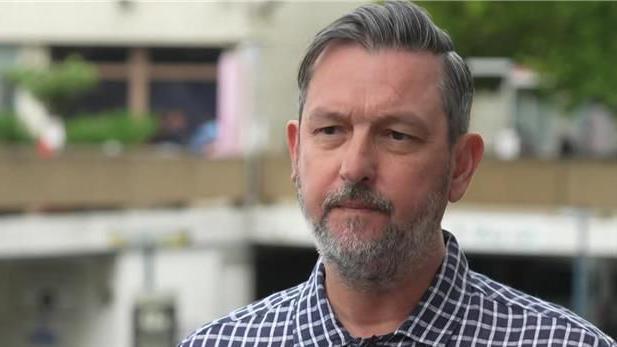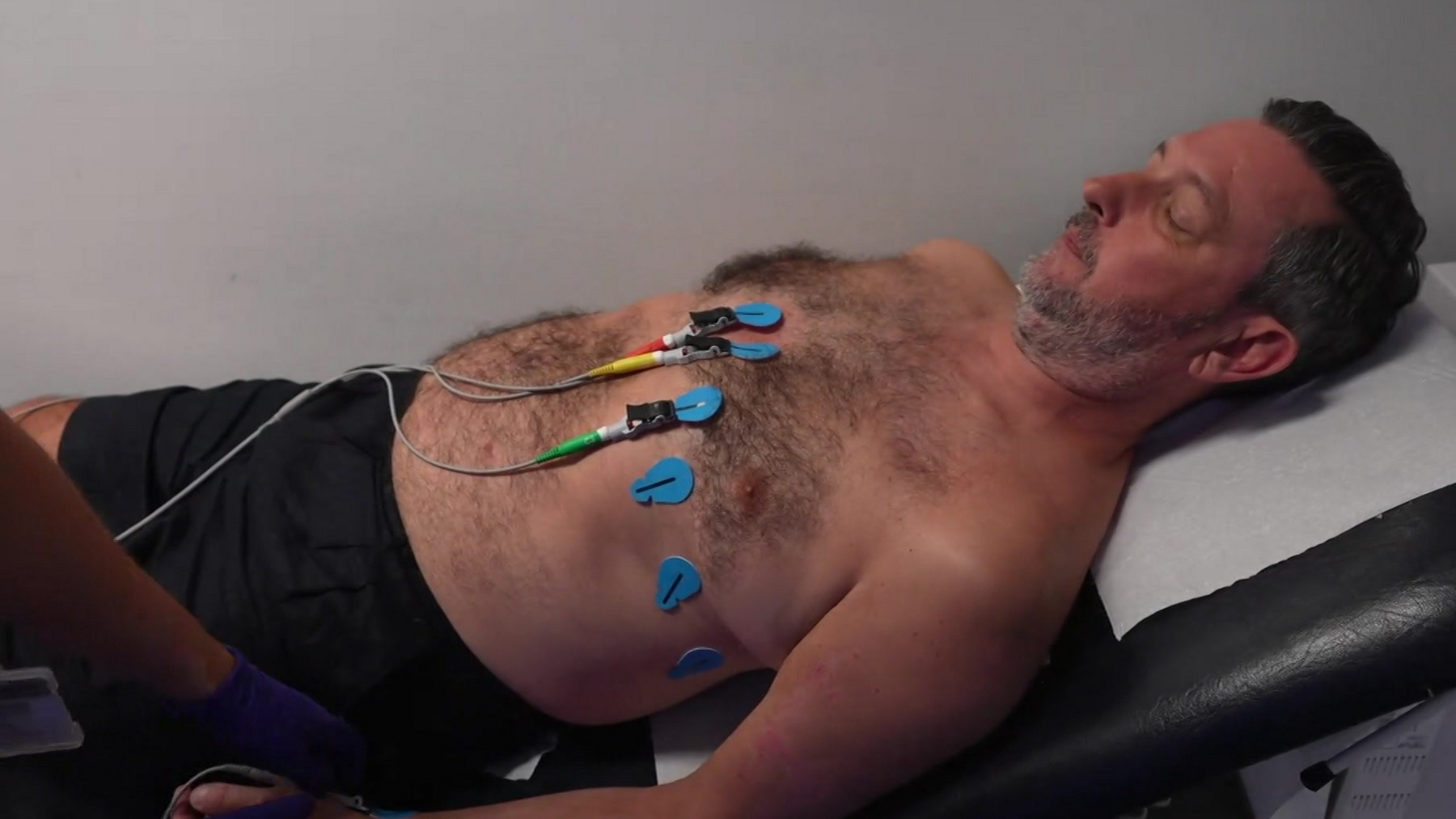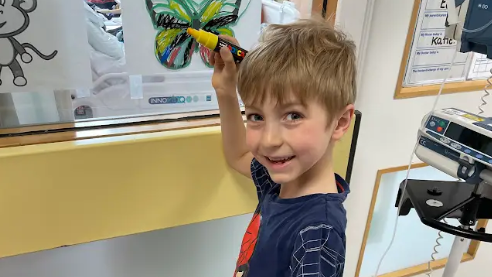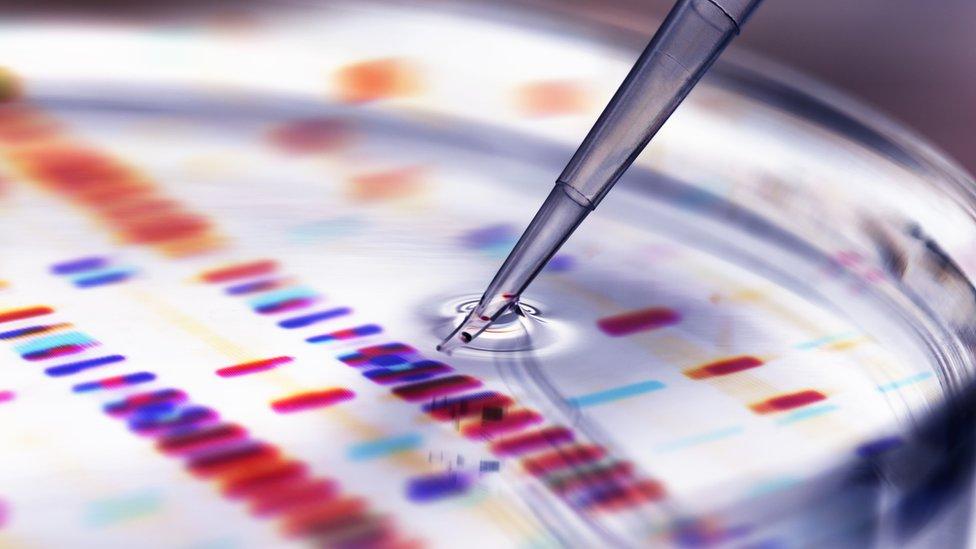'What caused my cardiac arrest at 40?'

Chris Worwood had a cardiac arrest at the age of 40
- Published
"Anybody walking round now could be about to have a cardiac arrest, you just don't know, and that's the shocking thing. One minute you're walking down the street and the next minute you're gone."
Chris Worwood had a cardiac arrest at the age of 40.
Fourteen years on, the 54-year-old from Balham still has regular checks at St Thomas' Hospital and as part of his treatment, he has genetic tests.
"If you can find something in your genetics that can identify before that happens, that's a game changer," he said.
The gene testing Chris undergoes is part of a new genomics population health service.
Nurses across England will be trained as "genomics champions" in local communities to help patients get faster diagnoses and access life-saving treatment closer to home.
It is part of the government's 10 Year Health Plan to ramp up innovation in the NHS.

Chris still needs more tests to find the definitive cause of his cardiac arrest
The Department of Health and Social Care (DHSC) said the aim is to enhance the identification, prevention, diagnosis and treatment of various conditions such as cancer, heart diseases, and rare genetic disorders – including kidney and neurological conditions – that can go undetected for years.
Specially trained nurses, along with other NHS staff, will help patients and family members through genetic testing that can identify the inherited causes of these major conditions.
It will also enable them to find patients suitable for genomic testing, and genomic counselling if needed, the DHSC added.
Chris still needs more tests to find the definitive cause of his cardiac arrest.
Dr Teofila Bueser, who is based at Guy's and St Thomas' NHS Foundation Trust and also from the Genomic Medicine Service Alliance said: "Genetic testing is really important because if a patient has a cluster of symptoms and it can be hard to make sense of that, it helps to get to a diagnosis and that patient gets the right treatment.
"If a person has a clinical diagnosis for something they suspect is genetic, then a genetic test can confirm that."
Catherine Renwick, nurse consultant at Guy's and St Thomas' NHS Foundation Trust added: "If we can predict disease in patients and provide treatment early on, then it will reduce the burden on the NHS in the longer term which we desperately need to do."
Chris has now had a defibrillator implanted into his chest and, due to genetic testing, he will be monitored for the rest of his life.
'Risk prediction and prevention'
Prof Bryan Williams, chief scientific and medical officer at the British Heart Foundation (BHF), said: "If undetected and untreated, inherited heart conditions can be deadly and devastating for affected families.
"BHF research has discovered some of the faulty genes responsible for these frightening conditions and is evaluating novel approaches to correct them but there's more to do to prevent future tragedies."
He added: "It is encouraging to see the government's ambition to expand genetic testing at a population level.
"When fully established, the genomic population health service will bring cutting-edge science into routine clinical care to help reduce the number of preventable premature deaths."
DHSC health minister, Stephen Kinnock, said: "By creating new opportunities in genomic healthcare and research, we're not only improving patient care but also creating fulfilling careers that recognise and use nurses' invaluable expertise."
Prof Dame Sue Hill, chief scientific officer for England and the senior responsible officer for genomics in the NHS added: "It will enable more people to access genomic testing, not only for risk prediction and prevention, but also to help tackle the unmet needs of patients with undiagnosed conditions."
Listen to the best of BBC Radio London on Sounds and follow BBC London on Facebook, external, X, external and Instagram, external. Send your story ideas to hello.bbclondon@bbc.co.uk, external
Related topics
Similar stories
- Published21 June

- Published2 July 2024

- Published11 January 2024
